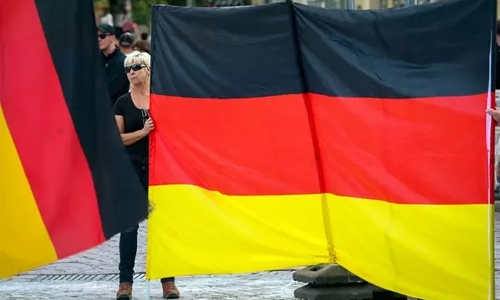Once a Communist state, now a far right state
On October 3, Germans celebrated Reunification Day, the moment when, 28 years ago, the former East and West Germany became one nation again. And yet this year, instead of celebrating our unity, there is a growing sense of estrangement. East and West are drifting apart again.
A few weeks ago, a young man was stabbed to death at a city festival in Chemnitz, a city in eastern Germany; afterward two asylum-seekers were arrested in connection with the attack. Large demonstrations broke out around the city, dominated at times by hundreds of right-wing extremists. Some raised their hands in the Hitler salute; journalists and counterdemonstrators were verbally and physically attacked; a mob threw stones at the owner of a Jewish restaurant. Similar demonstrations broke out in Köthen, a town of 30,000 inhabitants in the eastern German state of Saxony-Anhalt.
And on Oct. 1, the police arrested seven men accused of planning attacks on politicians and foreigners on Oct. 3. These events are not random. While violent crimes committed by right-wing extremists are down from 2016, they are still far more frequent in the five eastern German states than in the west, according to the annual report of Germany’s interior secret service. And then, there are the polls. The eastern states of Brandenburg and Saxony will both hold elections next September. For both states, pollsters predict record results for the far-right populist Alternative for Germany party. East Germany was, of course, a Communist country; today it is a hotbed of far-right sympathy and outright hatred. What happened?
The question angers Wolfgang Thierse, a Social Democrat and former president of the German Parliament, who was raised in the East. In the 1970s, he worked briefly for the Ministry of Culture in the German Democratic Republic, or East Germany, but he was let go after refusing to support the expulsion of Wolf Biermann, a popular singer and critic of the Communist government. There is no such thing as “the East,” Thierse told me. Eastern Germany, he says, is not one place, but a mix — areas of prosperity, creativity and economic innovation next door to areas of economic squalor and despair.
Thierse’s assessment is reflected in the government’s annual “Report on the State of the German Union,” which was presented last week. While pensions and wages are rising and unemployment is down, the average income in the former East lags the former West by around 15 per cent. The eastern economy sports some champion businesses, but has altogether fewer large companies, and lesser international investment. The eastern states have an older demographic, and a harder time finding qualified workers.
The economic differences are just one piece in the puzzle of why the East seems so far to the right. Other explanations focus on the legacy of the political culture of the German Democratic Republic. Many across Germany felt like Chancellor Angela Merkel imposed her decision to accept a large number of refugees on the country — but eastern Germans, having lived under an authoritarian regime, reacted more strongly to decisions they feel they did not have a say in.
Second, there are fewer migrants living in the east; people there lack the opportunity for everyday interactions with them, and thus harbor irrational fears of outsiders. Some also claim that eastern Germans, not having learned what democracy is like, are more easily frustrated with its tedious processes and often less-than-perfect results. Johannes Staemmler stresses a different point. Staemmler, born in the eastern city of Dresden in 1982, co-founded Third Generation East, a network of young professionals of eastern German descent. Today, he’s a scientist and counselor working for a think tank in Potsdam, outside Berlin. He points out that many who joined the far-right protests in Chemnitz or vote for the Alternative for Germany are too young to have more than the faintest memories of the GDR. But they do remember the radical changes of the 1990s: privatisation, the rapid death of East German industries and ensuing job losses.
Thierse and Staemmler, both born in the East, are heard and respected by Germans on both sides of the geographic divide. Overall, however, the debate about what’s happening in the east is dominated by western voices. Even 28 years after Germany’s reunification, most prominent journalists are westerners, as are most prominent policymakers and business leaders. So when Germany discusses why the east is so far right, condescension almost inevitably sneaks in: For the sake of the argument, eastern Germany is unbuckled from the rest of the country, and the historical border is redrawn. In this new, old divide, eastern Germans are reduced to being subjects of analysis and policy proposals — never participants in the conversation.
The east and west are still like unequal siblings. The strong one loves his smaller and uglier brother and accepts that his deviant behavior comes from trauma, but he still looks down on him. This subjugation of eastern Germans to mostly western German psychoanalysis is a political drama in itself. It seems like even in their most violent, most determined actions, eastern Germans can never be agents. “Yes, eastern Germans are on the couch,” said Staemmler when I offered this interpretation. To him, however, the current public analysis is not necessarily disenfranchising. He says it could also become a moment of political empowerment.
Suddenly people who haven’t voted in decades are going to the ballot box. They may not vote for the party the rest of the country would like them to vote for. But at least they are politicized, and have the nation’s attention. “You could also look at it this way: Whoever is on the couch has the chance to talk.” Whichever way, it really is the moment to talk. It may mean talking to someone who is yelling at you, as Staemmler puts it. But it still is better to try it anyway, instead of letting eastern Germans sink back into scornful silence.
Related Posts

